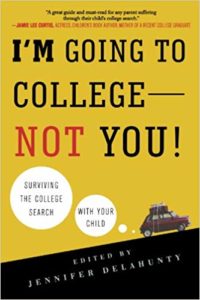“College choice has become the crucible of anxiety for millions of parents and students across the country. Acceptance of a son or daughter by a top college, as defined by the nebulous prestige mongers, has become the coin of the realm, the ultimate “good parenting” seal of approval. The better the bumper sticker, the better the parent, right? Every cocktail party from Manhattan to Monterey includes conversations about college tours, SAT tutors, summer “enrichment” programs, and ultimately, application and acceptance lists.”
— I’m Going to College–Not You! p. 3
If you’re a parent guiding your child through the college admissions process, you’re bound to feel a hodgepodge of emotions: frustration, joy, loneliness, pride, and more.
Jennifer Delahunty, Dean of Admissions and Financial Aid at Kenyon College, compiled the experiences of many parents who underwent the same process and shared their best lessons. These parents — many of them well-known writers, university deans and admission insiders themselves — add another layer of insight to a universal parenting rite-of-passage.
We read 27 parents’ accounts of their experiences helping their kids through the college admissions process. Some of them suffered; some of them thrived. Some of them felt proud of their children; some felt concerned. If you’re asking yourself how to avoid being a helicopter mom, a nagging dad, or a nonchalant parent, let these experienced parents be a lesson for you.
Here are SocratesPost’s 5 best lessons from 27 parents’ experiences with their kids’ college admissions.
1. Let your kids experience failure.
“In my first years as a dean, I was often surprised by the kind of young men and women who ended up in my office. I expected to see some students from disadvantaged backgrounds, students for whom the academic rigor or the distance from home or the experience of being surrounded by such wealth, could be a difficult adjustment. I expected some students with disabilities and health issues that affected their ability to get their work done. But the ones who surprised me were the students who had had every advantage — and therein lay the problem. Without the constant monitoring and propping up by the parents and the resources they marshaled for their kids—the private schools, pricey college counselors, therapists, coaches—their kids fell apart. These were kids who had no experience with failure, because parents or their extensive support system had never let it happen. Once they’re at college, though, small issues can become much more serious and their utter surprise that the seriousness of their predicaments is, well, surprising.” p. 94
2. Don’t let your kids just go through the motions.
From Katherine Sillin, Williams College graduate and Director of College Counseling at North Yarmouth Academy, in Waterville, Maine:
“I’m often asked the question that goes something like: ‘which will look better, teaching tennis lessons to eight-year-olds, or volunteering to restore trails in a nearby state park?’ I assume they’re referring to how all of this will look to the colleges. My response is almost always the same:

